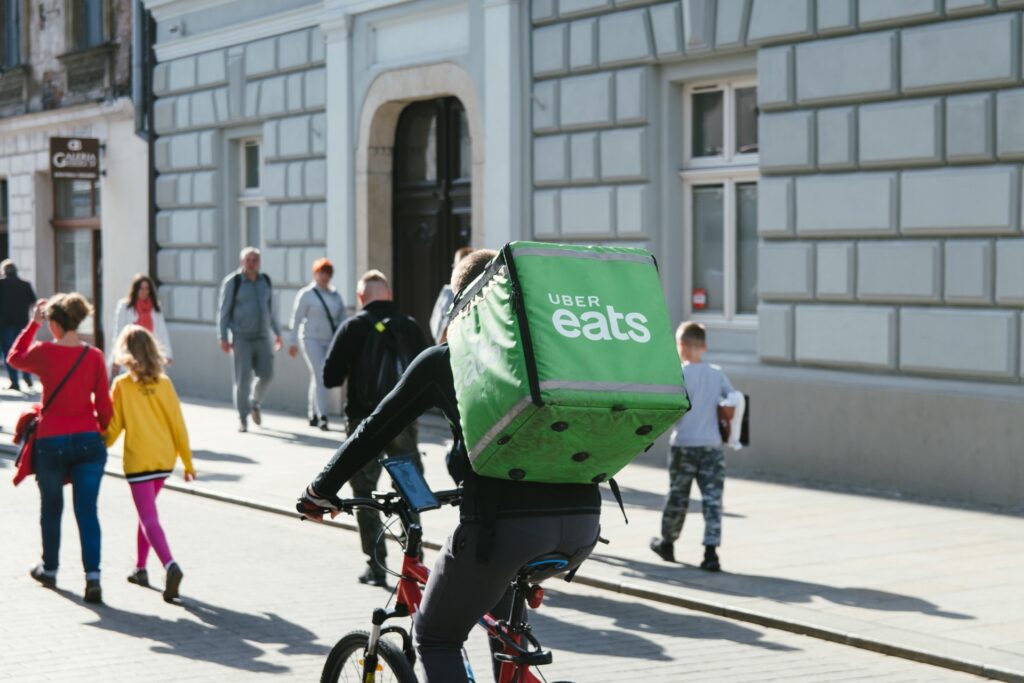Following a lengthy court battle, Uber has now conceded defeat in their battle to classify drivers as self-employed. The UK supreme court had rejected their appeal which meant that drivers would be classified as workers entitling them to minimum wage, holiday pay and pensions which Uber has said it will comply with. What effect will this have on the gig economy though and will it be able to adapt?
The ruling in Uber BV and others (Appellants) v Aslam and others (Respondents) [2021] UKSC 5 means that all 70,000 drivers are now entitled to the minimum wage of £8.72 per hour, they have also committed to holiday pay which will be paid fortnightly at the rate of 12.07% of earnings as well as automatically enrolling them onto a pension plan with contributions from Uber as per requirements. Uber has also said they will continue offering free insurance which covers sickness, injury and parental payments.
One large point of contention that could set a path for a new court date is the times where Uber will pay the minimum wage. The supreme court ruled that drivers were working in “any period when the driver was logged into the Uber app within the territory in which the driver was licensed to operate and was ready and willing to accept trips.” There was also no mention of the backpay for the time worked since 2016 when the case was taken to the employment tribunal.
Uber has however stated that they will only pay minimum wage during the periods where drivers have a passenger in the vehicle arguing that if they paid for the time where they were logged on to the system but without passengers that they would need to introduce shifts taking away the flexibility that drivers desire.
James Farrar and Yaseen Aslam of the App Drivers & Couriers Union who led the original case have signalled that a further challenge will be forthcoming stating that “Uber drivers will be still short-changed to the tune of 40-50%” based on the time they spend waiting for a job. They went on to say that “we cannot accept anything less than full compliance with legal minimums.” Farrar later tweeted confirming that they will indeed be returning to court in the near future.
TBC we’re not accepting Uber’s below legal minimums offer. Uber must accept the SC ruling and pay for all hours logged in not just the time on trip. Me, @Yaseenaslam381 and our team @PHJennings1760 @galbraithmarten Rachel Mathieson & Sheryn Omeri will be back in court v Uber soon
— James Farrar (@jamesfarrar) March 17, 2021
The Mayor of London, Sadiq Khan has also made his voice heard insisting driver must be paid the minimum wage as per the ruling stating “This announcement by Uber is certainly a step in the right direction. However, it’s not enough, Uber must ensure it fulfils its legal obligation to give drivers full workers’ rights. Uber drivers have been let down and that needs to change.” Transport for London licenses Uber so failure to comply could result in further complications and legal battles.
How will the minimum wage ruling affect the gig economy?
The ruling specifically dealt with Uber driver but with the precedent set, nothing is stopping other gig economy workers from starting their own cases to receive the minimum wage and other rights. The gig economy covers a range of applications from taxi firms such as Uber and Addison Lee, courier services for Amazon and DPD, takeaways for Deliveroo and Just Eat or even the plumbing firm Pimlico Plumbers. Having to pay minimum wage for the time logged-in would entirely shake up their business models and may even make some financially unviable.
Uber’s reaction contrasts with the courier Hermes who worked constructively with the unions after losing an employment tribunal to create a new status called “self-employed plus.” This meant their couriers were able to negotiate their own conditions including pay above minimum wage, holiday pay and union representation. This won them praise from GMB union general secretary Tim Roache who said, “Full credit to Hermes. They’re showing that the gig economy doesn’t have to be an exploitative economy and we look forward to working with them through this groundbreaking agreement.”
Many gig economy workers do so to enjoy the flexibility of the working conditions particularly if they only accept jobs on a part-time basis. This ruling will have consequences on that flexibility if the unions continue to push for the minimum wage for time logged-in to the system. Uber may decide to limit the number of drivers who are able to log on at a given time to limit costs or even restrict the ability to reject jobs. Such action would likely reduce the demand to work for Uber and possibly even increase unemployment if Uber decides to reduce the number of drivers they have on their books
Uber and fellow gig economy operators have already faced a series of lawsuits worldwide over workers rights and the victory in the supreme court will only serve to inspire further battles to be paid the minimum wage across different jurisdictions.
Are you a gig economy worker seeking to be paid the minimum wage? Alston Asquith has offices in London and Hertfordshire and can arrange a call to provide some initial advice on the steps to take.
We pride ourselves on our relationship with our clients as well as the service we provide. View some of our feedback on Trustpilot.

Read more
Uber drivers are workers and are entitled to employee benefits rules Supreme Court
Summerfield Browne v Waymouth Trustpilot ruling fallout continues
The great ‘work from home’ debate: government guidance to remain until June but should flexibility remain afterwards?
